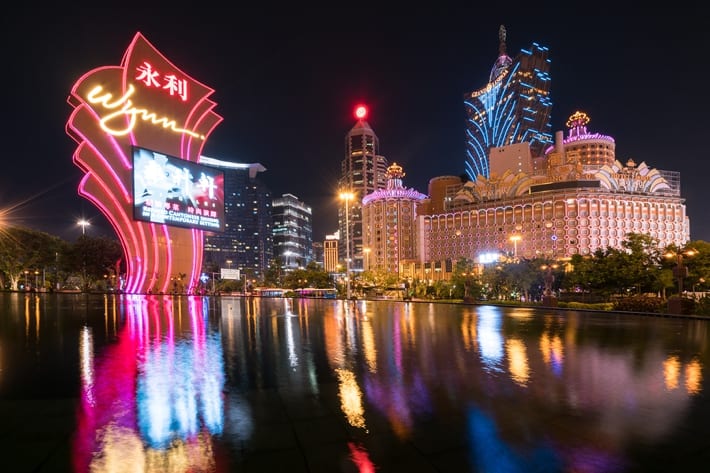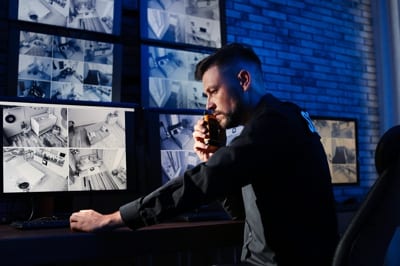 Most people that enter a casino believe that they have a fair crack of either winning or losing money based on nothing more than how they play. Professionals run the numbers on the various games on offer and will sit down at the poker or blackjack table knowing that there’s a chance that they can lose a good chunk of money, but that if they’ve done their sums right then they’ll win more than they lose. Casinos don’t mind, however, because there are also plenty of casual players who are just there to enjoy themselves and will almost certainly end up losing more money than the professionals win.
Most people that enter a casino believe that they have a fair crack of either winning or losing money based on nothing more than how they play. Professionals run the numbers on the various games on offer and will sit down at the poker or blackjack table knowing that there’s a chance that they can lose a good chunk of money, but that if they’ve done their sums right then they’ll win more than they lose. Casinos don’t mind, however, because there are also plenty of casual players who are just there to enjoy themselves and will almost certainly end up losing more money than the professionals win.
Yet in Macau, the Chinese territory that has slowly become the epicentre of global gambling, casinos are moving the odds even more in their favour thanks to their use of Artificial Intelligence. They are using hidden cameras and facial recognition technology to track which customers are likely to be the biggest losers, allowing them to maximise their net wins wherever possible. Given that more than three million people roll into Macau on a monthly basis, there are plenty of ‘losers’ to choose from thanks to the ever growing use of technology.
How the Tech Works

Casinos have long used technology to help them keep their operations running smoothly, from cameras that can keep an eye on croupiers and pit bosses through to the RFID technology installed in chips in Las Vegas to mean that the casinos can disable chips if they’re removed from the property.
The idea behind the tech being introduced in Macau is to take things a step further, putting facial recognition technology into the cameras in order to track people as they move around the venues, whilst digitally enabled baccarat tables and poker chips allow the casinos to monitor how much money people are betting and what they’re betting on.
The technology will use algorithms to process how different customers behave when they’re placing bets, figuring out whether or not they have much of an appetite for risk. Those that enjoy side bets, for example, or tend to place bets on high-risk events, can yield the casino up to ten times more net wins than a standard gambler. On top of that, the tech can help casinos identify any players and dealers or croupiers working in collision.
What the Technology Will Be Used For
 As players are tracked around the casino, the information gleaned from the RFID-enabled chips and facial recognition software will be fed back to a central database. In the database, a risk profile will be drawn up based on how many and what type of bets the customers are placing. Once the profile has identified the players that are most likely to take risks and therefore lose the most money, casinos can then begin to target them to make their experience more pleasurable.
As players are tracked around the casino, the information gleaned from the RFID-enabled chips and facial recognition software will be fed back to a central database. In the database, a risk profile will be drawn up based on how many and what type of bets the customers are placing. Once the profile has identified the players that are most likely to take risks and therefore lose the most money, casinos can then begin to target them to make their experience more pleasurable.
Casinos will be able to rate every player that comes into their property based on metrics, such as how long they spend there, how much they bet, how keen they are to take a risk, how many chips they have left, what their win / loss ratio is and even their net worth. Once the casino has figured out whether or not it’s worth trying to maintain that customer based on those metrics, it can then begin to figure out ways to keep them happy.
One of the companies offering the technology, Dallmeier Electronic, which is based in Regensburg, Germany, has facial recognition software that can be used to alert the floor manager of a high-value customer’s presence in the casino. Once they make their way to a table, the floor manager can immediately send staff over to offer them drinks or services that will be of use to them whilst they gamble.
Andrew Lo, the Executive Director of the listed arm of junket operator Suncity, summed up how the casinos will use the technology. He said, “Those who can afford to lose, those who play even more when losing money, we can for sure offer them a free meal”. Suncity will install technology from Walker Digital in a new casino in Hoi An, Vietnam.
Why Do Casinos Feel They Need to Use Artificial Intelligence?

The amount of money involved in gambling nowadays means that many people will wonder why on earth casinos need to try to target people. After all, the old cliché goes that the house always wins, so if they’re delivering such a regular net win, what need could there be to use technology to gain themselves even more money?
In many ways, the answer lies in the fact that the gambling industry in Macau has been slowing down in recent years, thanks in no small part to China’s sluggish economy. In April of 2019, the gross gambling revenue was around $2.9 billion, which was down 8.3 percent from the year before.
Obviously $2.9 billion doesn’t seem like a particularly worrying amount of money, but it is spread across the casinos and some, such as Wynn Macau Limited, saw their stocks make a 22% gain, whilst others, like MGM China Holdings Limited, lost 1.6% in the same period. The need to try to recoup this loss is pressing, which is part of the reason for the casinos turning to technology.
The fall off in gross gambling revenue was partly down to high rollers staying away from the casinos, which helps to explain why Macau’s casinos feel the need to do more in terms of maintaining their interest when they’re actually in the building and spending money. China’s middle-class is the main target market for Macau, with the mainland provided two-thirds of the visitors to the gambling mecca.
On top of that, the technology will allow the casinos to keep an eye on their workers, detecting collusion between players and croupiers or dealers. It will also allow them to prevent fraud, which is important for casinos. Finally, the technology will be able to double as a performance management tool, giving the casinos the ability to monitor things, such as how quickly the dealers move the game on and so on.
Worries About Privacy
One of the chief objections to an increased amount of surveillance technology is the fact that customers who tend to spend a lot of money also value their privacy, so they’re unlikely to be too keen on having their data collected or movement monitored. It’s also possible that law enforcement officers and governments might want access to the data being collected by the casinos, which could lead to some high-rollers staying away.
On the flip side of that, the fact that casinos in Macau are moving so quickly to install the new technology is suggestive of a country and a people more au fait with the idea of data collection than their European and US counterparts. After all, China does have a network of surveillance cameras that already use facial recognition software that are installed throughout the country.
Ben Lee, who is a Managing Partner at the Asian gaming consultancy IGamiX, believes that the new technology could quickly become illegal, saying, “This new technology certainly has the potential to infringe the law as it expands the scope of players whose breadth and range of activities would now be tracked”. He also pointed out that if the information gleaned from the use of technology was sent offshore in order to be analysed then that would almost certainly be breaking the law.
Lo, the man from Suncity, isn’t so sure that people will object, however. He thinks that most customers assume their bets are already being watched, pointing out that China’s facial recognition software is already very mature. It is used at the likes of border controls and banks a planning to install it, so according to Lo, “If you’re afraid of this, then you’re very likely a criminal and casinos won’t do business with you anyway”.
When the Las Vegas-based Walker Digital Table Systems demonstrated technology at an industry conference in Macau, the Vice President of Asia Operations, John Orth, informed a potential buyer that customers ‘don’t even realise they are being tracked’. Walker Digital offer technology that will allow casinos to track chips invisibly, watch wagers and even game various outcomes.
The Technology Is Only Likely to Improve
 Whilst technology is mostly being planned for use in tracking high-spending customers, the likelihood is that further developments in the field will mean that it is soon expanded for uses in other areas. In the world of casino gambling, any slight thing that can give a company the edge will be employed, such are the small margins on which they operate.
Whilst technology is mostly being planned for use in tracking high-spending customers, the likelihood is that further developments in the field will mean that it is soon expanded for uses in other areas. In the world of casino gambling, any slight thing that can give a company the edge will be employed, such are the small margins on which they operate.
Artificial Intelligence and Machine Learning can be used in countless different ways by casino operators, including using chatbots to deal with customer’s online enquiries, natural language processing to help call centres and even Deep Learning devices to field phone calls for casino’s restaurants. Another key area is in using Machine Learning to spot credit card fraud as it happens, comparing transactions in real time.
Both AI and ML are likely to be put to use across the industry as the technology grows, mainly in areas, such as marketing departments and network security. The only problem in the tech’s expansion is whether or not the various governing bodies will allow it to be disseminated across the board in brick and mortar casinos. Macau will be an interesting test case for the future of both industries.